Helicopter Parenting
What is a Helicopter Parent?
Helicopter parenting involves parents who pay extremely close attention to their child’s life, who is overprotective, and who are excessively interested in their child’s life.
Of course, there is nothing wrong with parental involvement. In fact, developmental psychology has found that involved relationships are critical in raising healthy people. However, some involvement can backfire if proper boundaries are not set.
Helicopter parents tend to have a lot of worry and anxiety surrounding their children, which can cause them to be overinvolved and overbearing in their kids’ lives.
What is Helicopter Parenting and Why is it Bad?
Helicopter parenting is a parenting style where parents are overly focused on their children.
Some people refer to helicopter parenting as “over-parenting.”
Helicopter parenting can start with good intentions; the parent just wants to be close to their child, involved in their lives, and wants to protect them.
When a parent is present and engaged in their child’s life, it comes with many benefits, like feelings of love, security, and acceptance.
However, helicopter parenting can impact many aspects of a child’s life, including confidence, self-esteem, and mental health.
Why Do Parents Become Helicopter Parents?
Helicopter parenting can develop from a number of different factors that can include:
- Anxiety
- Fear of rejection
- Overcompensation
- Peer pressure
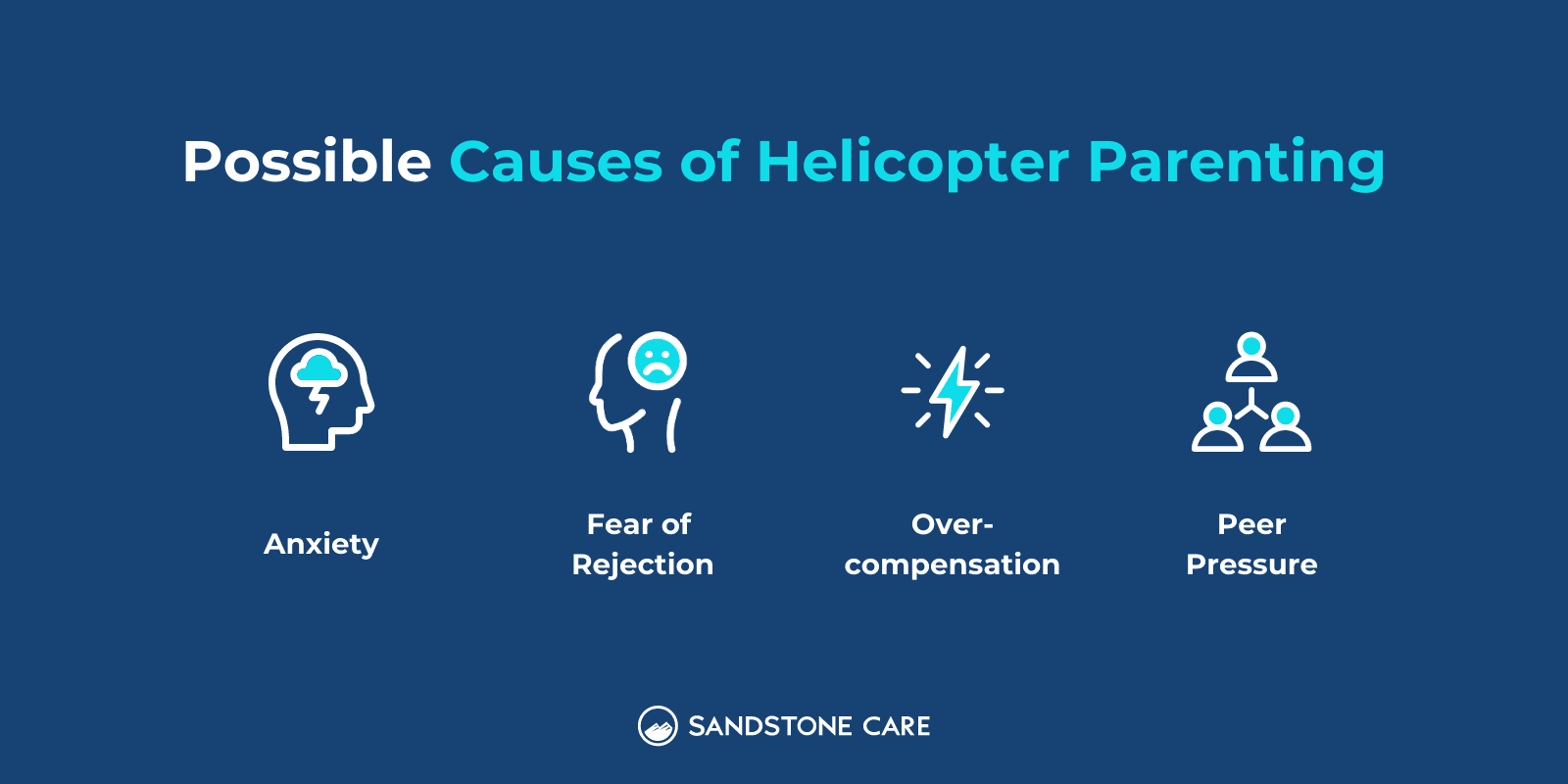
What is the New Term for Helicopter Parents?
Another term similar to helicopter parenting is “lawnmower parenting.”
“Lawnmower parenting” refers to a style of parenting where the parent does anything and everything to take care of any challenge or obstacle that stands in their child’s way. This limits the child’s ability to learn important resiliency skills and handle their own problems as they grow.
What Happens to Children of Helicopter Parents?
Children of helicopter parents may have challenges becoming independent and gaining confidence and may be more likely to experience anxiety or depression.
The over-involvement from the parents can often prevent the child from learning important lessons. The child could potentially miss out on crucial life skills because they are sheltered from the mistakes they need to grow.
Characteristics of Helicopter Parents
What Are The Characteristics Of Helicopter Parents?
Some of the most common characteristics of helicopter parents include:
- Worry about their children’s safety
- Having strict rules for their children
- Solving problems for their children
- Constantly supervising and correcting
- Overly involving themselves in their children’s academic performance or sports
- Anxiety and fear
- Fear of failure
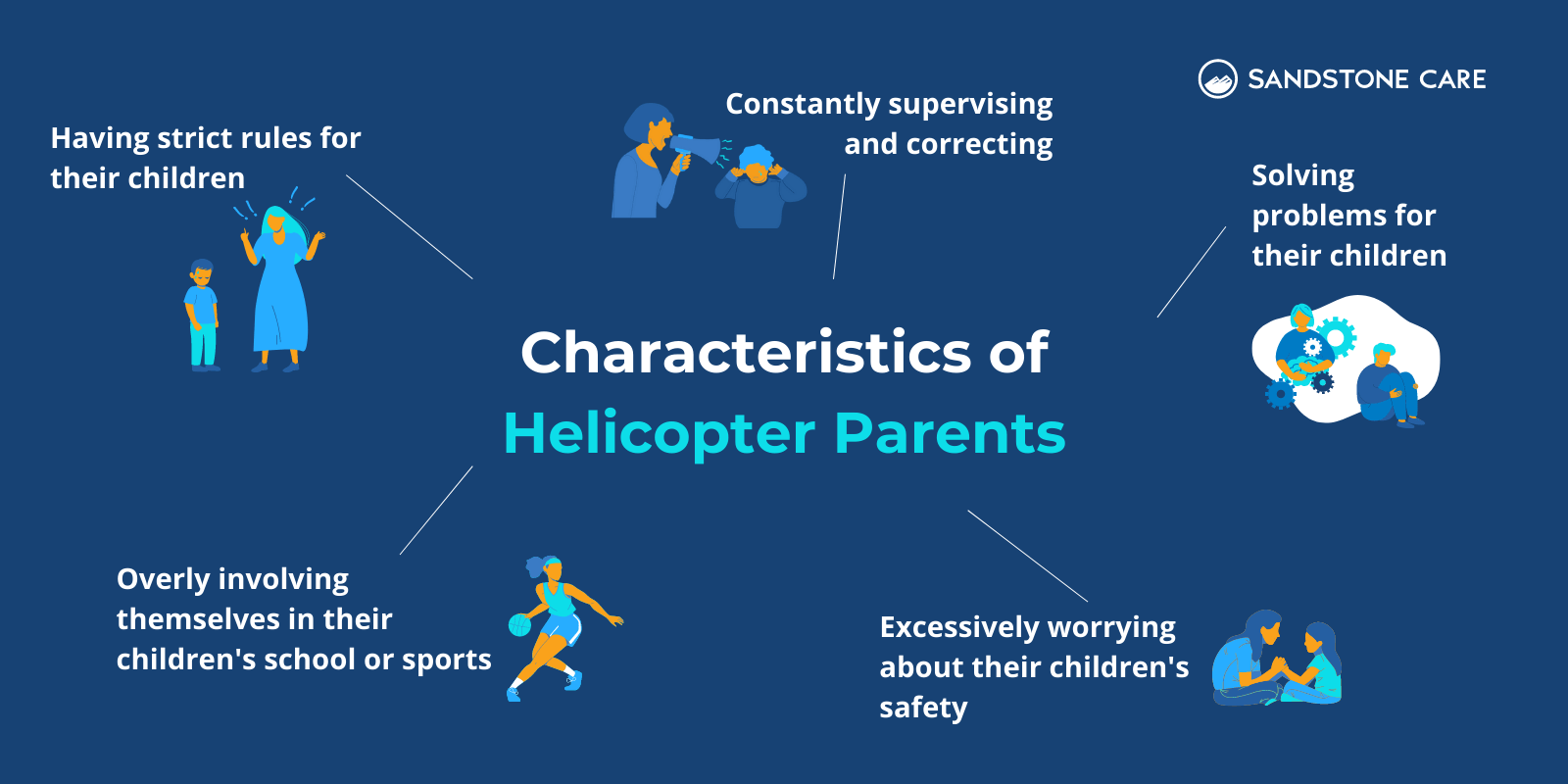
How Do I Know If I Have A Helicopter Parent?
Signs that you may have a helicopter parent can include:
- Feeling that you are not an adult, even if you are
- Having trouble with decision-making
- Feeling challenged with problem-solving skills
- Doing things independently feels difficult
- Finding it challenging to make friends
- Experiencing anxiety
- Having low self-esteem
- Challenges with emotion regulation
- Avoiding conflict
What Are The Signs Of A Helicopter Mom?
Helicopter parenting is believed to be more common in mothers than in fathers.
Common behaviors and signs of a helicopter mom or dad can include:
- Cleaning up after them and doing their chores
- Having excessive anxiety about their child getting hurt or something happening to them
- Making decisions for their child
- Being overinvolved in school or sports
- Excessively tracking or controlling their child’s social media
- Constantly stepping in so their child doesn’t make mistakes
It is also important to take into consideration what is age appropriate.
Younger children (usually in elementary school) are dependent and require a certain level of parental supervision and involvement. At a young age, heavy involvement is normal and healthy. But, as they grow into high schoolers, college students, and eventually into adults, they should gain more independence, space, and freedom.
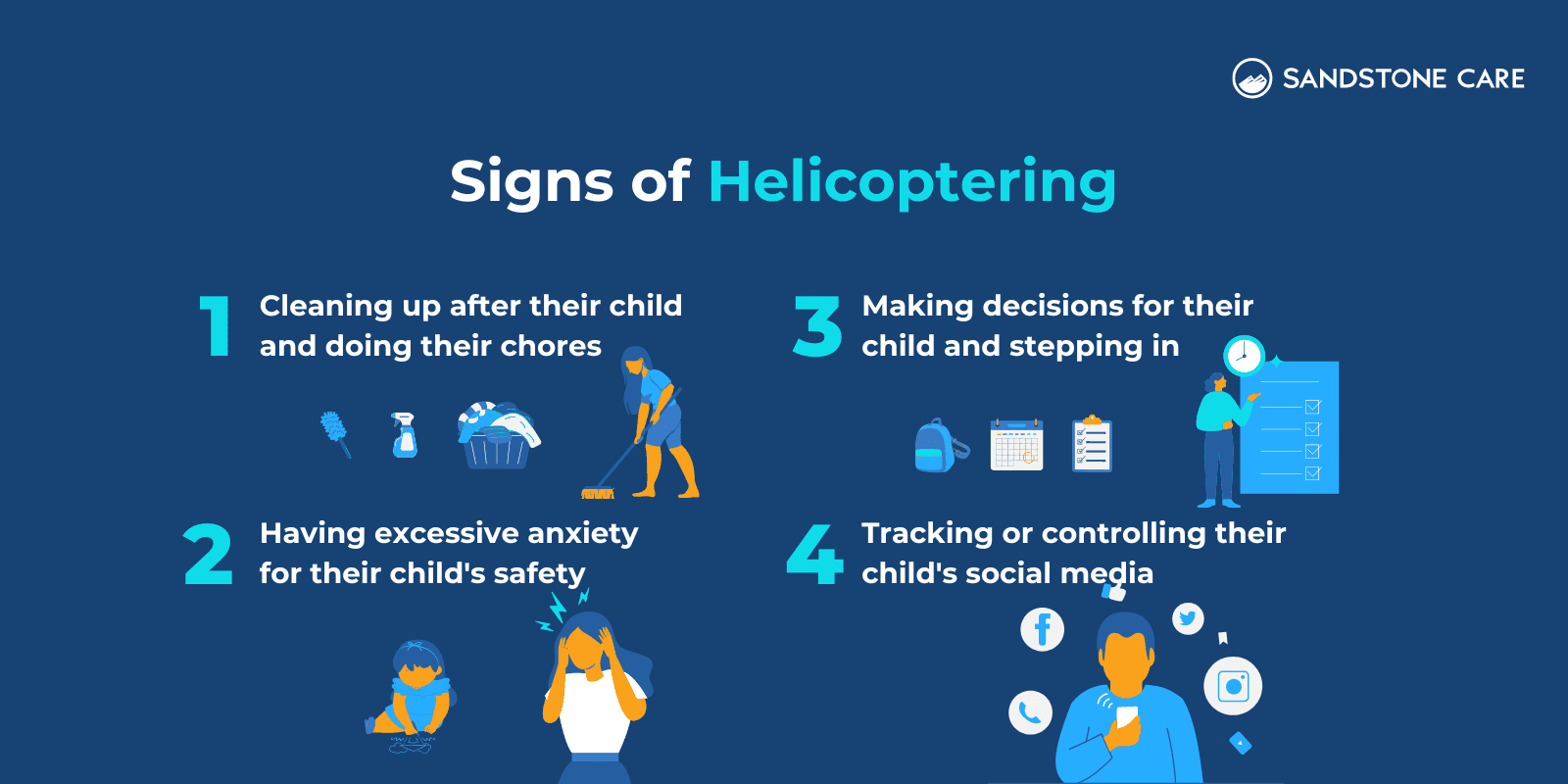
What Drives Helicopter Parents?
Helicopter parents often have high anxiety.
This can make them very worried about their children. It is a parent’s job to protect their child, but with helicopter parenting, they want to control and be involved in every aspect of their children’s lives.
Helicopter parents are very focused on ensuring they don’t make any mistakes with their kids and that their children are thriving, often at the expense of their child’s privacy and independence.
Sometimes conditions and events such as chronic illness or disabilities can trigger helicopter parenting.
Parents who are excessively worried about their children due to past events can often unintentionally limit their growth. Sometimes, this leads to neglecting the healthy siblings, sometimes called “glass children.”
What Is The Psychology Of Helicopter Parents?
Helicopter parenting often stems from this desire to protect their children in every way possible.
It is often driven by worry and anxiety, which leads to excessive and overbearing behaviors that can end up harming their child in the long run.
Helicopter Parenting Examples
What Is A Real-life Example Of Helicopter Parenting?
Helicopter parenting can come in many different forms.
For example, a helicopter parent may do their child’s homework or a high school project to ensure they get a good grade or so the child doesn’t have to stress over it.
It is common for a helicopter parent not to want to see their child fail. Because of this, they may over-involve themselves in their children’s lives. This may include filing out job applications for them or trying to get them into the college they want through shortcuts and connections.
A helicopter parent may also overschedule their child, fill their free time with extracurricular activities, and hold their children to high standards.
Other examples of helicopter parenting can include:
- Controlling their friend group
- Treating their adult children as a babies
- Talking to their teachers or coaches over minor issues
- Tracking their child at all times
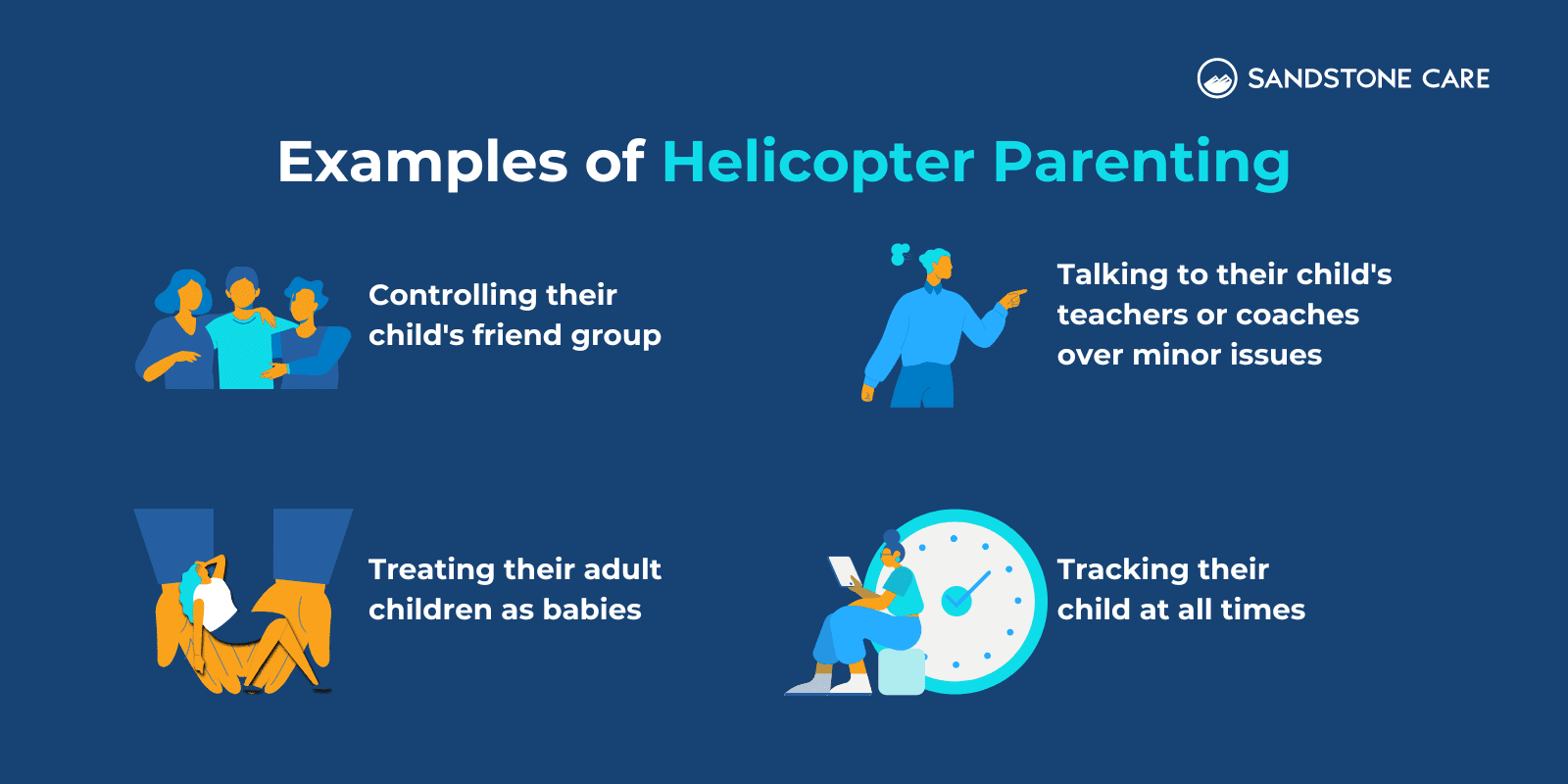
Helicopter Parenting Effects
What does Helicopter Parenting do to a Child?
While it may start with good intentions, helicopter parenting can impact a child’s development and keep them from learning important life skills.
Helicopter parenting can impact a child’s confidence and lead to low self-esteem and a lack of independence that may follow them into adulthood.
They may be unsure of themselves and their abilities. When the time comes to be their adult, it can be a very difficult transition as they have not learned important lessons and skills in being responsible for themselves.
What are the Mental Effects of Helicopter Parenting?
Helicopter parenting is often associated with anxiety in both the parent and the child.
It can also contribute to negative feelings about themselves, their lives, and their capabilities.
Helicopter parenting can be mentally damaging to a child, and it is important to be aware of the impact on your child and make a conscious effort to change.
What are the Long-term Effects of Helicopter Parenting?
Over-involved parents and helicopter parenting can lead to long-lasting effects on their child’s mental health that can follow them into adulthood.
Helicopter parenting can contribute to mental health conditions including depression and anxiety.
Children of helicopter parents can also find themselves with a negative self-image, low self-esteem, and low self-confidence.
Because of this, they may believe that they are incapable of accomplishing things on their own, which can affect the things they do as adults, whether it is in work, school, relationships, or any other aspect of their life.
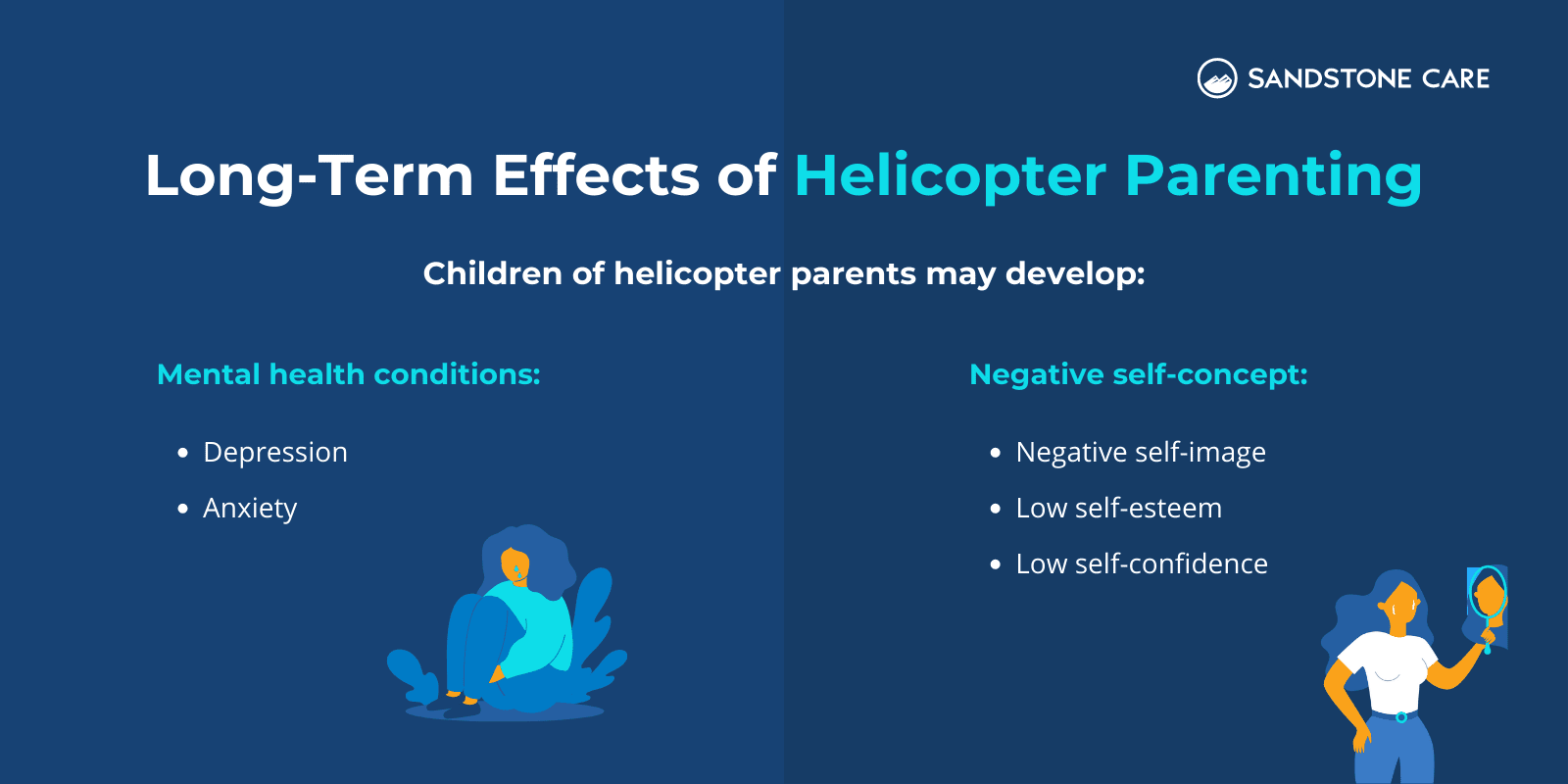
What are the Pros and Cons of Helicopter Parenting?
Helicopter parenting may come with some advantages. However, many of these are outweighed by the adverse effects it has on the child.
For example, helicopter parenting can help keep a child safe, as the parent knows their whereabouts and has a close eye on what they are doing at all times.
Helicopter parenting may make the parent feel happier at the moment because they have a sense of control. But, this feeling often comes at the expense of their child’s happiness and well-being in the long run.
What are the Positive Effects of Helicopter Parents?
One way to look at helicopter parenting positively is that the child is getting a lot of support and guidance.
Helicopter parenting does not make you a bad person. However, it is important to recognize that it involves unhealthy habits that need to be addressed and unlearned.
What are Three Impacts of Helicopter Parenting?
Three major impacts of helicopter parenting can include:
- Anxiety
- Low-self esteem
- Lack of independence
Opposite of Helicopter Parent
What’s the Opposite of a Helicopter Parent?
The opposite of a helicopter parent is one who lets their child explore and be independent while offering the support and supervision they need.
They give room to their child to learn things on their own and make mistakes.
Free-range parenting is a style of parenting that involves raising children by encouraging independence and giving them the freedom to experience new things on their own that are appropriate to their age.
This style of parenting is believed to promote creativity, independence, and important life skills.
What are the Four Types of Parenting Styles?
The four most common parenting styles in psychology include:
- Permissive
- Authoritarian
- Authoritative
- Neglectful
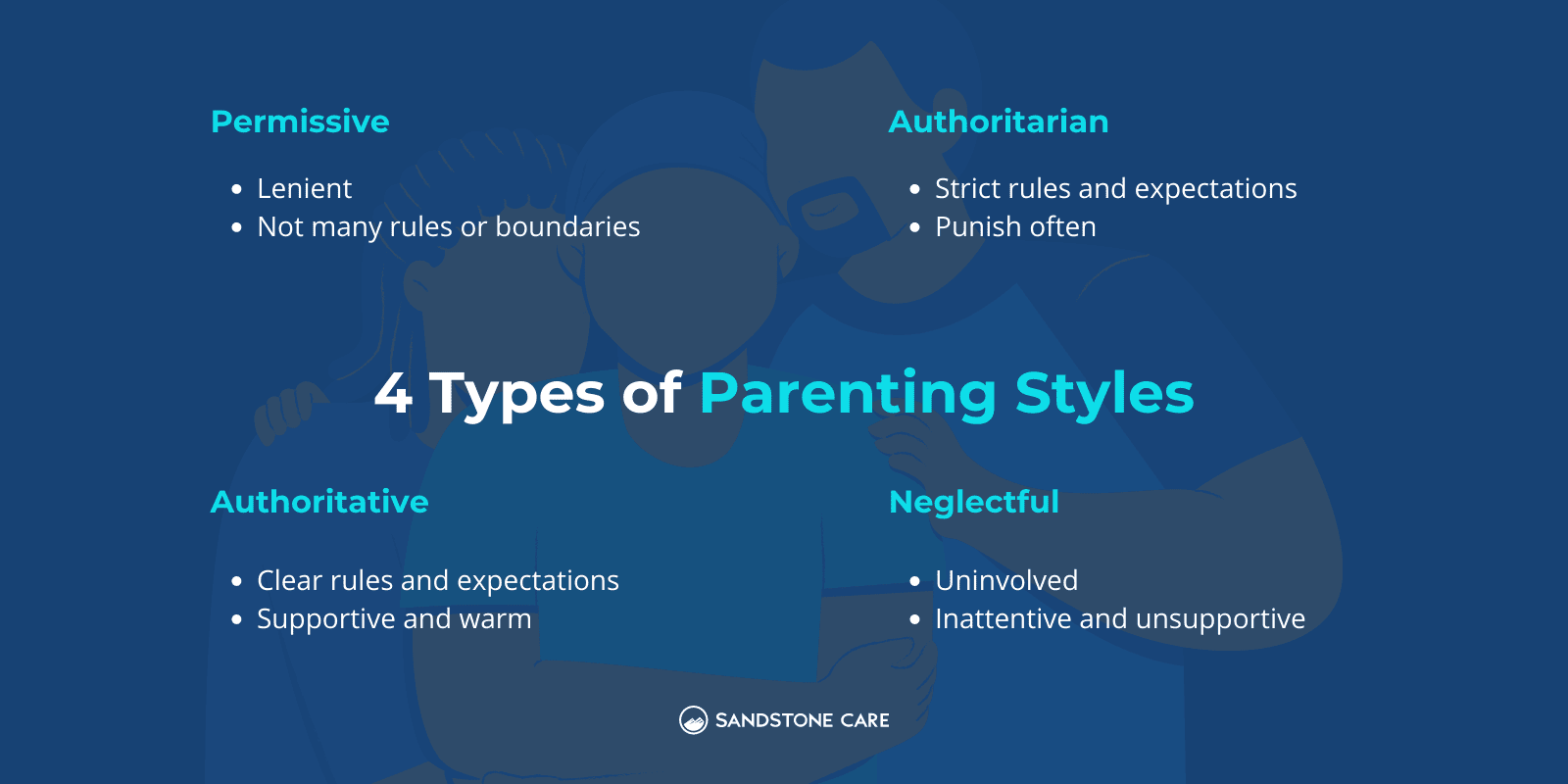
How to Stop Being a Helicopter Parent
Can You Unlearn Helicopter Parenting?
Some ways to unlearn helicopter parenting can include:
- Giving your child space over time
When your children are babies and toddlers, they depend on their parents, and you should be there for them for supervision, care, and support. But, as they get older, you can give them more space and opportunities for independence as they grow into adults.
- Instead of making decisions for them, help them make their own
Offering them choices and guiding them when they ask for support can show them that you are still always there for them when they need you, without being overbearing.
- Learn that it is okay to make mistakes
Both children and adults are going to make mistakes, and trying to make sure there are no mistakes in their life can keep them from learning important lessons and skills.
- Instead of handling their problems, give them the tools to handle their own
Having healthy communication with your child and teaching them how to manage emotions and problems can help prepare them for when they are faced with challenges.
- Give them appropriate responsibilities
Helicopter parents tend to do everything for their child, even things the child should be doing themselves at an older age, like cleaning their room, doing their laundry, or packing their food. Holding your child responsible for certain tasks and chores can help build independence.
Helicopter parenting often doesn’t start with bad intentions, and many parents think they are doing what’s best for their children when in reality, it can be harming them.
Remember that when you stop being a helicopter parent, it doesn’t mean you stop loving your child. You can still love, support, and empower your child with boundaries and different approaches.
If you have difficulty unlearning helicopter parenting, it can be helpful to go to therapy and talk to a professional who can help you navigate these new changes and address any underlying concerns that may be impacting these patterns.
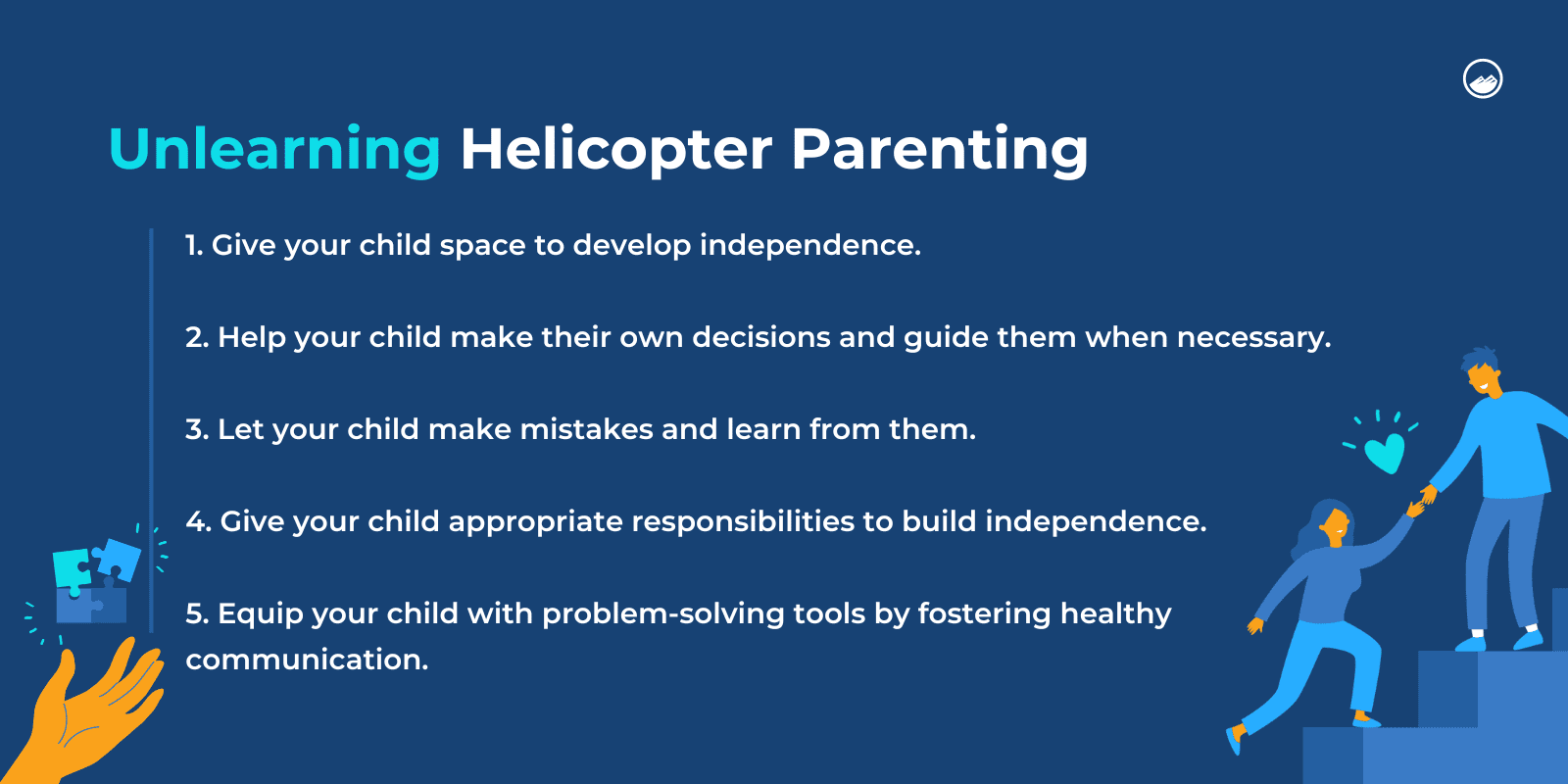
What Should Parents Focus on Instead of Being Helicopter Parents?
One thing you can do as a parent trying to stop helicopter parenting is to get to know your child as their own person.
Often, helicopter parents don’t view their children as their own person or do not want them to grow up or become independent and not need their parents anymore.
But, if you get to know your child as an individual and see their strengths, you can feel more confident in knowing that they will be okay and that they can do things on their own.
Focus on building a strong connection with them instead of being over-involved in their lives so that they know they can go to you when they need to.
Dealing with Helicopter Parents
How do I get my Parents to Stop Being Helicopter Parents?
One of the first steps in helping your parents stop being helicopter parents is by becoming aware of their behaviors and understanding that the way they treat you is not a reflection of your capabilities.
Trying to communicate and understand why parents are helicopter parents in the first place can help give you some guidance on how to change it.
Setting boundaries, creating your own space, and communicating can help show your parent that you also have needs and are your own individual.
Taking over tasks that they may do for you, such as cleaning or cooking, will help build your independence and also show them that you are more than capable of doing these things for yourself.
If you are finding it difficult to work with your parents on stopping helicopter parenting, seeking help from a professional and attending therapy both individually and together can give you support and tools to break the pattern.
How to Survive Helicopter Parents?
Having helicopter parents can really take a toll on your mental health and well-being.
Learning patience when interacting with helicopter parents can be a big step, but it is also important to learn how to set boundaries and find ways to communicate with them and work together.
Becoming defensive or getting into arguments can make matters worse, and it can be helpful to get support from a therapist to help guide you and your family through unlearning old behaviors, learning new ones, and navigating everyone’s feelings and emotions.
How do you Reverse the Effects of Helicopter Parenting?
Helicopter parenting can have long-lasting effects on the child.
If you have had a helicopter parent and find yourself facing challenges from the experiences you have had with them, focusing on yourself and getting support can help you address these challenges and learn new coping skills and how to change unhealthy patterns.
FAQ
You have questions. We have answers.
Our goal is to provide the most helpful information. Please reach out to us if you have any additional questions. We are here to help in any way we can.
Overparenting and overprotection can be common parenting styles of narcissists.
Individuals with narcissistic personality disorder have a need for control that can be presented in the way they parent and how they interact with their children.
Helicopter parenting is so common because many parents aim to ensure their child is safe and happy.
However, some parents take this desire to an extreme level, where they feel they have complete control of their children’s lives and success.
Helicopter parents are often worried, anxious, and over-protective parents.
As a parent, it is completely normal to worry about your child’s well-being and safety and want the best for them.
But, helicopter parents’ worries often cause them to be overinvolved and overbearing in their child’s lives. They often struggle with an overwhelming need for control. They frequently suffer from conditions such as anxiety.
A tiger mom is a strict parent who pushes their child to achieve high levels of success.
This parenting style can be very harsh and demanding and have a negative impact on the child.
Often, tiger moms don’t offer their children the emotional support they need. Helicopter moms, on the other hand, may over-support their children emotionally.
Bulldozer parents try to keep their children away from any pain or failure by removing obstacles out of their way.
For example, if their child is not doing well in a class, they may call their teacher and demand that they change their grade or do something about it rather than working on it with the child or seeing ways they can learn the content.
The difference between helicopter parenting and bulldozer parenting is that helicopter parents hover over their child’s lives, while bulldozer parents actively try to create a perfect life for their children so that they do not experience failure.
Helicopter parenting can be damaging and unhealthy for both the child and the parent.
While it may be well-intentioned, helicopter parenting is not considered a healthy form of parenting.






